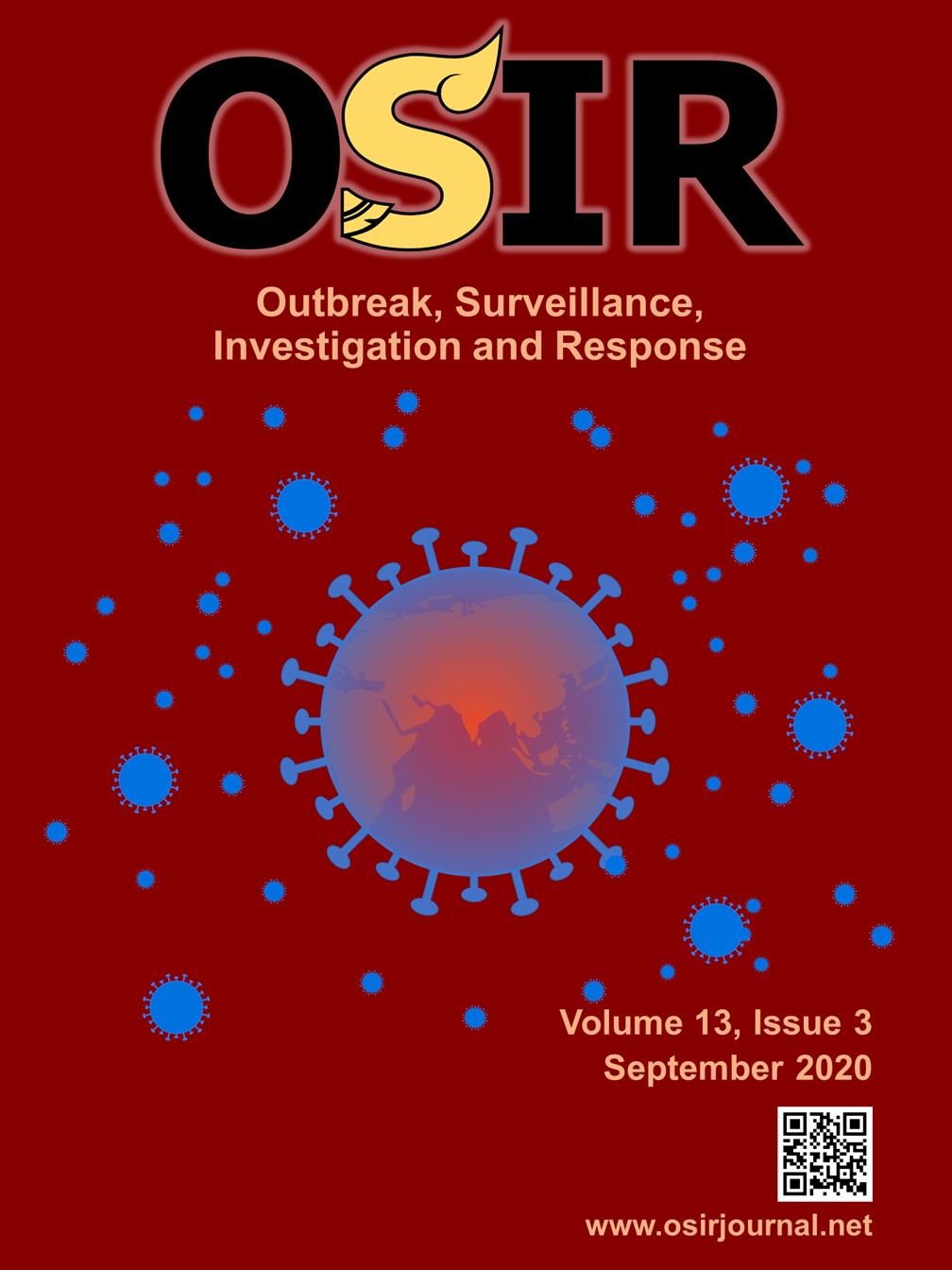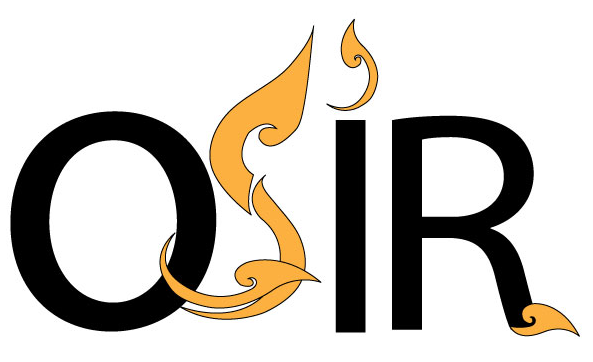Factors Associated with Preventive Behaviors towards Coronavirus Disease (COVID-19) among Adults in Kalasin Province, Thailand, 2020
DOI:
https://doi.org/10.59096/osir.v13i3.262803Keywords:
coronavirus disease, preventive behaviors, Kalasin, ThailandAbstract
Coronavirus disease (COVID-19) is a pandemic disease that has caused devastating morbidity and mortality worldwide. Social stigmatization in rural communities of Thailand prevented effective response to the pandemic. This study aimed to determine factors associated with preventive behaviors towards COVID-19 in Kalasin Province, Thailand. An analytic cross-sectional study was conducted among 556 local residents aged at least 15 years old. The questionnaire was developed based on Predisposing, Reinforcing and Enabling Constructs in Educational Diagnosis and Evaluation (PRECEDE) and media perception theories. Most of the residents were female (61.3%) and aged 15-70 years old (mean 37.9 years old, SD 11.7). All of the risk perception, severe perception, benefit perception, media perception, attitudes, and preventive behavior scores were at a good level whereas knowledge on COVID-19 was at a moderate level. Income (β 0.10, p 0.003), risk perception on COVID-19 (β 0.20, p<0.001), media perception (β 0.41, p<0.001), and attitudes toward COVID-19 (β 0.24, p<0.001) were associated with preventive behaviors. These findings provide predicting factors of preventive behaviors towards COVID-19. Definite health education programs, especially for increasing accessibility on COVID-19 prevention, and effective policies should be implemented, particularly for low-income groups.
References
World Health Organization. WHO Director-General's statement on the advice of the IHR Emergency Committee on Novel Coronavirus [Internet]. Geneva; 2020 Jan 23 [cited 2020 Sep 1]. <https://www.who.int/dg/speeches/detail/whodirector-general-s-statement-on-the-advice-ofthe-ihr-emergency-committee-on-novelcoronavirus>
World Health Organization. Coronavirus disease (COVID-19) situation reports 2020 [Internet]. Geneva; 2020 [cited 2020 Sep 1]. <https://covid19.who.int/?gclid=Cj0KCQjwrIf3BRD1ARIsAMuugNtVVJdOssg7JWpJYGcd022B7fN8xIh97qhn3g4YEzLuYmYkt8m4Hh8aAkRgEALw_wcB>
Thai Department of Disease Control. Coronavirus disease (COVID-19) situation report [Internet]. 2020. [cited 2020 Sep 1]. <https://ddc.moph.go.th/viralpneumonia/index.php>
World Health Organization. WHO Director-General's remarks at the media briefing on 2019-nCoV on 11 February 2020 [Internet]. Geneva; 2020 Feb 11 [cited 2020 Sep 1]. <https://www.who.int/dg/speeches/detail/whodirector-general-s-remarks-at-the-mediabriefing-on-2019-ncov-on-11-february-2020>
Flaxman S, Mishra S, Gandy A, Unwin HJT, Mellan TA, Coupland H, et al. Estimating the effects of non-pharmaceutical interventions on COVID-19 in Europe. Nature. 2020 Aug;584(7820):257-261.
Namwat C, Suphanchaimat R, Nittayasoot N, Iamsirithaworn S. Thailand’s responseagainst Coronavirus disease 2019: challenges and lessons learned. OSIR. 2020 Mar;13(1):33-7.
Thai Department of Medical Services. Medical practice guideline for diagnosis, treatment, and prevention of hospital infections towards COVID-19. Nonthaburi: Thai Department of Medical Services; 2020.
Srisilapanan P, Champathong A, Sasakul S. Older people received news during the pandemic of coronavirus disease 2019 (COVID-19). J Gerontol Geriatr Med. 2020;19(1):e3.
McLeod DM, Wise D, Perryman M. Thinking about the media: a review of theory and research on media perceptions, media effects perceptions, and their consequences. Review of Communication Research, 5, 35-83.
Porter CM. Revisiting precede-proceed: a leading model for ecological and ethical health promotion. Health Education Journal. 2016;75(6): 753-64.
Bashirian S, Jenabi E, Khazaei S, Barati M, Karimi-Shahanjarini A, Zareian S, et al. Factors associated with preventive behaviours of COVID-19 among hospital staff in Iran in 2020: an application of the Protection Motivation Theory. J Hosp Infect. 2020;105(3):430-3.
Olum R, Chekwech G, Wekha G, Nassozi DR, Bongomin F. Coronavirus disease-2019: knowledge, attitude, and practices of health care workers at Makerere University Teaching Hospitals, Uganda. Front Public Health. 2020; 8:181.
Karasneh R, Al-Azzam S, Muflih S, Soudah O, Hawamdeh S, Khader Y. Media's effect on shaping knowledge, awareness risk perceptions and communication practices of pandemic COVID-19 among pharmacists. Res Social Adm Pharm. 2020 Apr 23: S1551-7411(20)30430-7.
Zhong BL, Luo W, Li HM, Zhang QQ, Liu XG, Li WT, et al. Knowledge, attitudes, and practices towards COVID-19 among Chinese residents during the rapid rise period of the COVID-19 outbreak: a quick online crosssectional survey. Int J Biol Sci. 2020;16(10):1745-52.
Wikipedia. Kalasin Province [Internet]. 2020[cited 2020 Sep 23]. <https://th.wikipedia.org/wiki/%E0%B8%88%E0%B8%B1%E0%B8%87%E0%B8%AB%E0%B8%A7%E0%B8%B1%E0%B8%94%E0%B8%81%E0%B8%B2%E0%B8%AC%E0%B8%AA%E0%B8%B4%E0%B8%99%E0%B8%98%E0%B8%B8%E0%B9%8C>
Choi JS, Kim JS. Factors influencing preventive behavior against Middle East Respiratory Syndrome Coronavirus among nursing students in South Korea. Nurse Educ Today. 2016; 40:168-72.
MW. GLaK. Health program planning: An educational and ecological approach. New York: Emily Barrosse; 2005.
Kebede Y, Yitayih Y, Birhanu Z, Mekonen S, Ambelu A. Knowledge, perceptions, and preventive practices towards COVID-19 early in the outbreak among Jimma university medical center visitors, Southwest Ethiopia. PLOS ONE. 2020;15(5): e0233744.
Likert R. The method of constructing and attitude Scale”, Reading in Attitude Theory and Measurement. New York: John Wiley &Sons, Inc.1967. 6 p.
Best JW, Kahn JV. Research in education. 10th ed. London: Pearson; 2005.
StataCorp. Stata statistical software: release 13. College Station, TX: StataCorp LP; 2013.
Thailand Convention & Exhibition Bureau. The Aging population and the global trend [Internet]. 2019 Sep 22 [cited 2020 Sep 10]. <https://intelligence.businesseventsthailand.com/en/insight/aging-trends-01>
Abdelhafiz AS, Mohammed Z, Ibrahim ME, Ziady HH, Alorabi M, Ayyad M, et al. Knowledge, perceptions, and attitude of egyptians towards the novel Coronavirus disease (COVID-19). J Community Health. 2020.
Ahmad AR, Murad HR. The impact of social media on panic during the COVID-19 pandemic in Iraqi Kurdistan: onlinequestionnaire study. J Med Internet Res. 2020;22(5): e19556.
Bavel JJV, Baicker K, Boggio PS, Capraro V, Cichocka A, Cikara M, et al. Using social and behavioural science to support COVID-19 pandemic response. Nature Human Behaviour. 2020;4(5):460-71.
United Nations. During this coronavirus pandemic, ‘fake news’ is putting lives at risk: UNESCO [Internet]. 2020 Apr 13 [cited 2020 Sep 1]. <https://news.un.org/en/story/2020/04/1061592>
Downloads
Published
How to Cite
Issue
Section
License
Copyright (c) 2023 Outbreak, Surveillance, Investigation & Response (OSIR) Journal

This work is licensed under a Creative Commons Attribution-NonCommercial-NoDerivatives 4.0 International License.









